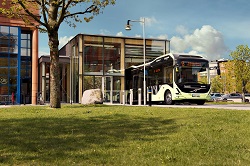Smart analytics helping to ease traffic snarl-ups in urban mobility
The SOUTHPARK (SOcial and Universal Technology HelPing to detect ARrivals via sdK) project, based on the predict.io system(opens in new window) is a Software Development Kit (SDK) which can be integrated in any kind of app and also in smart cars or trains. Throughout the project, many different cases that either use the real-time information of the detection or go in the direction of business intelligence using aggregated data were identified. Rendering processes such as, among others: parking payment automation; capacity planning for public transport, car sharing and rental bikes; handicapped guiding systems, and commuter travel analysis, means that the SDK stands to reduce bottle-necks in traffic systems. The project initially set out to cover issues relating to parking through their app ‘ParkTAG’ but broadened their scope as their work developed. Project coordinator Ms Sandra Kobel says, “Current customers integrate the SDK into their apps, which allows them to gather location data on their user base. With this data, they are able to analyse the behaviour of their users (e.g. a parking app wants to know where people that have their app park and move) or trigger an event when something happens (e.g. remind a user to stop paying the parking meter when they’ve driven away from their spot).” Through self-adapting algorithms, the predict.io SDK is able to detect the start and stop of any movement, either through an app or integrated in an IoT device. The development of a system that self-adapts quickly to new local settings was key to the SOUTHPARK project. To integrate the SDK with its STOP detection technology in various different mobility apps, the main indicators are location precision, time precision, detection delay, battery discharge, minimum precision, and minimum recall. predict.io sees the requirements for STOP in several mobility-related use cases. While other systems exist, the algorithms in SOUTHPARK’s SDK can very quickly self-adapt to new local settings, for example if integrated in a new app and/or in a new city or region. This, explains Kobel, was the machine learning part of the SOUTHPARK project. Being able to use a pre-existing system developed by predict.io saves developers time and money. “Our algorithms reduce the adaptation costs and time for localising to new settings by an estimated 75 % in comparison to the state-of-play when the project launched in 2015.” The reduction in cost and the speed boost have obviously been appreciated by developers. “When the SOUTHPARK project ended in July 2018, the SDK and analytics suite had been successfully launched across a variety of countries and were producing around 75 million data points a day,” says Kobel.







